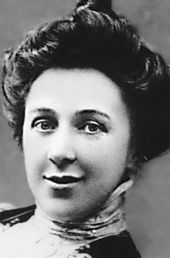| Maria Lilina | |
|---|---|
 | |
| Born | Maria Petrovna Perevoshchikova Мария Петровна Перевощикова (1866-07-03)3 July 1866 Moscow, Russian Empire |
| Died | 24 August 1943(1943-08-24) (aged 77) Moscow, Soviet Union |
| Occupation | Actress |
| Spouse | Konstantin Stanislavski |
Maria Petrovna Alekseyeva (Russian: Мари́я Петро́вна Алексе́ева, née Perevoshchikova, Перево́щикова, 3 July 1866 – 24 August 1943) was a Russian and Soviet stage actress, associated with the Moscow Art Theatre, better known under her stage name Lilina (Ли́лина). Konstantin Stanislavski, the MAT director, was her husband. In 1933 Lilina was designated as a People's Artist of the RSFSR.
Career
Lilina was a founding member of the MAT troupe which she joined in 1898. Her two breakthrough performances, which brought her to fame, were Masha in The Seagull and Sonya in Uncle Vanya, both praised for "fitting perfectly Chekhov's aesthetics." Also lauded were her Natasha in Three Sisters; later Varya in The Cherry Orchard and Nina Zarechnaya in the renewed Seagull.
In 1906-1915 Lilina played three parts in Alexander Griboyedov's Woe from Wit: Liza, a sly and clever peasant servant, as well as graceful Countess the Granddaughter, and Khlyostova, the latter with satyrical verve and wit. Her tandem with Stanislavsky in Leo Tolstoy's The Living Corpse (he Prince Abrezkov, she Anna Dmitriyevna) has been described as "the living amalgam of the fullness of life and the precision of the expression."
Lilina was said to have "understood perfectly the electrically charged dynamics of the Dostoyevsky prose, full of emotional overload," and was stunning as Karpukhina in The Uncle's Dream and as Khromonozhka (Limping Girl) in Nikolai Stavrogin (based upon Demons), according to Inna Solovyova. "Many considered her the most subtle and deep of the MAT actresses," this critic argued.
Lilina has always regarded her husband as her teacher and Stanislavsky often referred to her as his 'best ever student'. He dedicated his book The Actor's Work on Himself (Работа актера над собой) to Lilina. Her other notable roles included Tatyana in Dmitry Merezhkovsky's Joy Will Come, The Guest (The Life of Man by Leonid Andreyev) and Anna Andreyevna in The Government Inspector (1921).
After MAT's 1923-1924 foreign tour Lilina's domestic obligations started to prevail, her contribution to the theatre became limited. Since 1924 she's had only five new works, including Korobochka in Dead Souls and Yanina in The Embezzlers. In 1935 she started to read drama in Stanislavsky's last, Opera and Drama studio, and after his death directed all of the latter's productions.
References
- ^ Maria Petrovna Lilina. Biography at the Moscow Art Theatre site
- ^ Lilina, Maria Petrovna in Krogosvet, the On-line encyclopedia
- 1866 births
- 1943 deaths
- 19th-century actresses from the Russian Empire
- 20th-century Russian actresses
- Actresses from Moscow
- Actresses from the Russian Empire
- People from Moskovsky Uyezd
- Honored Artists of the RSFSR
- People's Artists of the RSFSR
- Recipients of the Order of Lenin
- Recipients of the Order of the Red Banner of Labour
- Russian stage actresses
- Soviet stage actresses
- Burials at Novodevichy Cemetery